Review for Yamada: Way Of The Samurai
Introduction
For some daft reason, I've taken to looking at the January releases from a distributor as some sort of sign, an indication of how the year will progress for them. It's a totally arbitrary perception of course. There's no real reason why the 31st of December should be a watershed for them, and the 1st of January should be a blank slate, and the reality is that these releases are planned months, if not years in advance, and in no way should they be indicative of the start of a new trend, or indeed the continuation of an existing one. Cine Asia's first release of 2012 is Yamada: The Way of the Samurai, or rather Yamada: The Samurai of Ayothaya, if you're looking it up on IMDB. It's a Thai movie, which made me wary from the off, as I haven't had a lot of luck with Thai movies. There's no doubting the action credentials of them, Thai Boxing is a remarkable cinematic discipline, and is as dynamic and visual a fighting art as any. Feet and fists, elbows and knees, combine to adaptive and creative ends, providing a breath of fresh air compared to other more rigid and stylised martial arts. No, the action in Thai movies is just fine. It's just the stories and acting that I am yet to appreciate. Then on the other hand, it turns out that Yamada: The Way of the Samurai is actually a celebration of 124 years of diplomatic ties between the two nations of Japan and Thailand. I've had a lot of luck with Japanese movies...
It's the Warring States period in Japan. Some of the warriors who fought for the losing sides in that multi-factioned civil war have become mercenaries, left Japan, and settled in Thailand, where they fight for King Naresuan of Ayothaya, against his traditional enemies the Hongsawadee. Yamada Nagamasa is ordered to hunt the raiders that plague Ayothaya, but his investigation uncovers a chilling truth. He finds that someone from the Japanese village is helping the Hongsawadee. Ordered to guard the knowledge of that treachery with his life, he has to find and deal with the traitor before anyone else realises. The traitor gets to him first, severely injuring him, and almost killing him before he is rescued by some passing Thai warriors.
They take him back to their city, where he's healed by a monk, and restored to strength. As he lives among them, he learns more of their culture and beliefs, and learns where his soul truly belongs. He also learns that he has much left to understand when it comes to martial arts and the way of the warrior. The people of Ayothaya are initially sceptical of this outsider in their midst, but the monk realises that Yamada's strength and loyalty are better suited to serving the king, and begins training him in Thai Boxing. But it's when Yamada combines his new skills and his old skills as a Samurai that he will stand above all other warriors. His loyalty to his new king will be tested by the oath he swore to keep the Japanese treachery secret.
Picture
Yamada does get a 1080p widescreen 1.85:1 presentation on this Blu-ray disc, but it isn't a particularly impressive one. The image quality is variable throughout, and very rarely does it look as if it is using the full 1080 resolution. The brightest of scenes, static landscape shots in full sunlight, will show exceptional detail, but much of the film suffers from an overall softness, as if it is up-scaled from a lesser resolution. The darker the image gets, the softer it looks, and this being a period piece filmed in natural light conditions, there are a lot of dark scenes. At that point, it looks like a DVD, with excessive grain, and prone to ghosting. The effects are terrible, and actually laughable. Blood sprays are painted on with CGI, as are sword blades, and decapitations, and it's overused to the point where it begins to look like a cartoon. Far better is the physical action, the martial arts and combat sequences, which have the benefit of not being overtly visually enhanced.
Sound
Audio comes in the form of DTS-HD MA 5.1 Surround Thai (with copious Japanese), and DD 2.0 in the same combination of languages. English subtitles do accompany these. I found the lossless audio to be robust, the dialogue was clear throughout, and there was a dynamic and effective reproduction of the action and ambience. The music score is of the excessively melodramatic and manipulative sort, so overwrought that it overpowers the actual emotion of the scene.
Extras
Yamada: The Way of the Samurai gets animated menus that mirror the style of the usual Cine Asia Blu-rays.
You'll find 12 trailers for other Cine Asia product, although no forthcoming titles are trailed on this disc.
In a trailer gallery you'll find the UK trailer and the original trailer.
Top of the extras list as usual is the audio commentary from Bey Logan. This for me is an indispensable addition to the film, as he puts the film in its historical context, pointing out just what is based on actual history and how much is fiction. It's also good to learn of the cultural nuances that a Thai audience will take for granted, but foreign audiences really need, to better understand some of the subtleties of the story.
You'll find four deleted scenes on the disc running to a total of 10 minutes. They are mostly domestic scenes with Yamada in the Thai city getting to know the locals and learning to appreciate their culture.
Finally there is the Masters of the Ring - Cine Asia Exclusive featurette which takes us to the Essex Kickboxing Academy, where the instructors, students, and a couple of home-grown world champions talk about the martial art, the sport and the discipline. This lasts 38 minutes.
Conclusion
Yamada: Way of the Samurai turned out to be more a Thai movie for me than a Japanese one and very little in its 90-minute runtime appealed to me. Its tale of an outsider adapting to a local culture, and finding himself more at home there than his own, has certainly been done before, not least in The Last Samurai, but Yamada's story is thin, and relies on a prior familiarity with national history that outside audiences quite naturally lack. The acting fails to convince in the majority of the cast. Oddly enough it isn't the action performers who fail (those who are cast as part of Naresuan's bodyguard, and Yamada's saviours are mostly sportsmen from the Thai boxing discipline); rather it's the actors in the more dramatic roles, including the lead actor Seigi Ozeki who offer lacklustre performances.
Finally, the reliance on CGI and special effects in the action sequences, adding fake sword blades and sprays of blood, looks horribly tacky and distracts from the film. The only positives are the displays of kickboxing, intense and brilliantly choreographed, looking astounding on film. There's one sequence of kick-boxers versus ninjas, with kick-boxers only armed with feet and fists and flaming torches, going up against sword wielding assassins, that looks absolutely stunning.
Yamada: Way of the Samurai has an interesting, and ambitious story to tell, uncovering a piece of history that we in the West will most likely be unaware of. It's only that A-list aspirations are let down by a B-list budget and production values. It's a film that really needs time and space to develop its story and its characters, as well as actors who bring across the full weight of that story. In Yamada, it really just comes across as just another action flick, with stock characters, like the ever-ruminating monk, the cute brat, and the appealing looking but ineffectual love interest, there to make up the numbers.
Once again it's another film from Cine Asia which I fail completely to appreciate on first viewing, but begin to get a better handle on when taken in with Bey Logan's commentary as a guide. I'm still not simpatico with Thai movie conventions, the acting styles and the excessive melodrama, which makes me unable to enjoy this film at anything other than the most basic action levels. For someone better versed in Thai cinema, Yamada: Way of the Samurai may be more worthy of consideration.
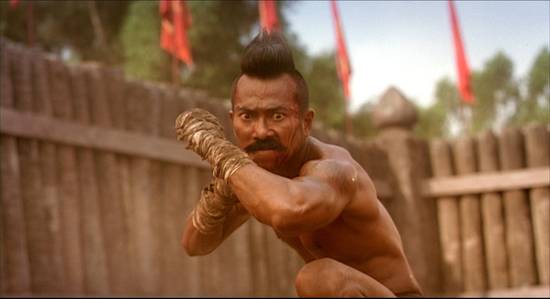

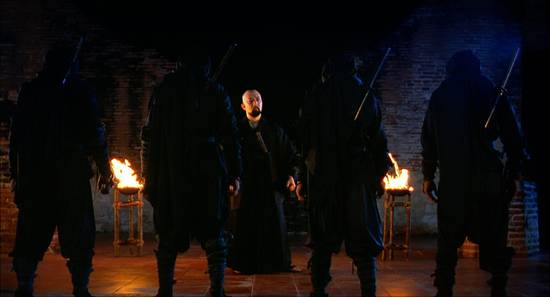
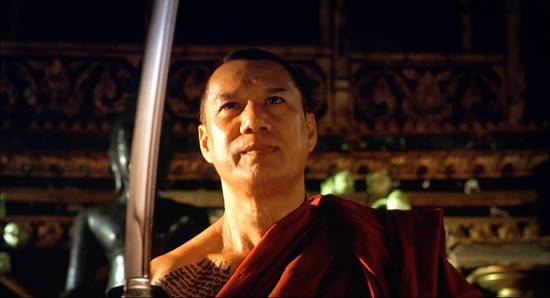
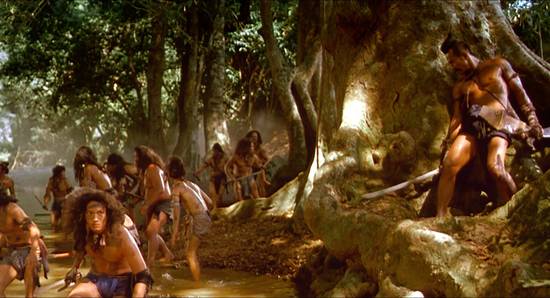
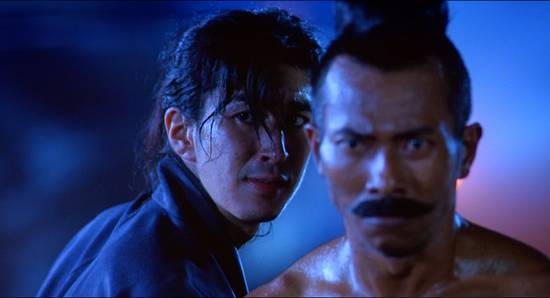
Your Opinions and Comments
Be the first to post a comment!